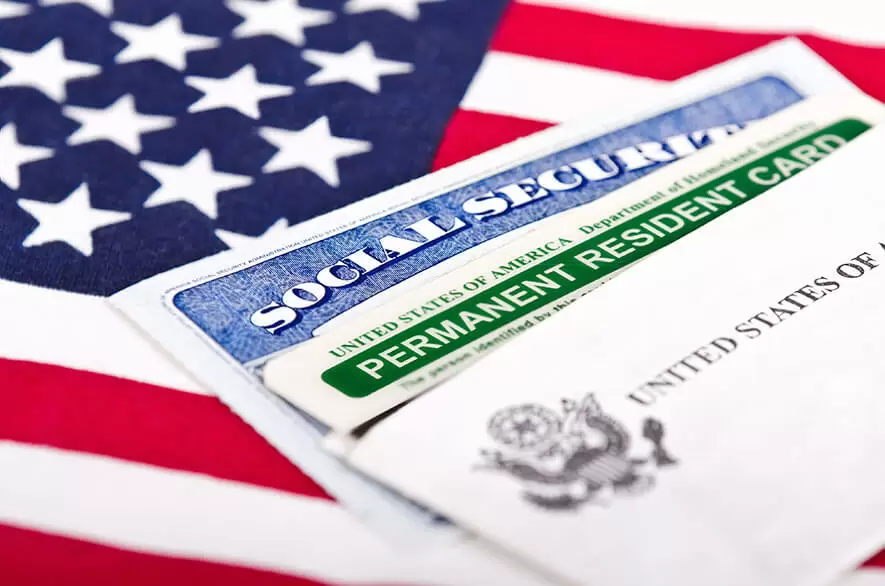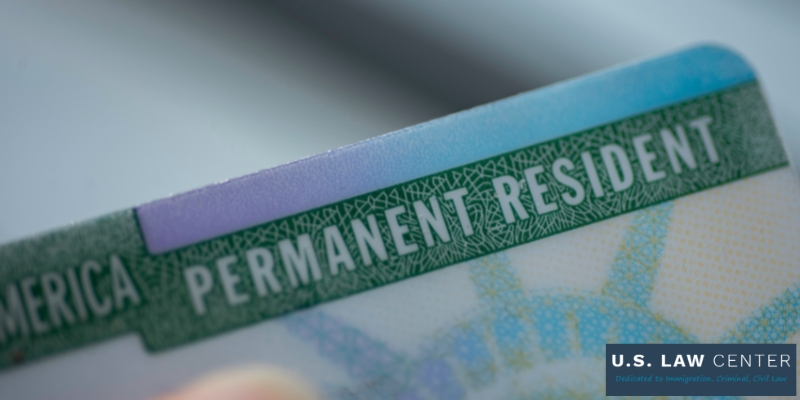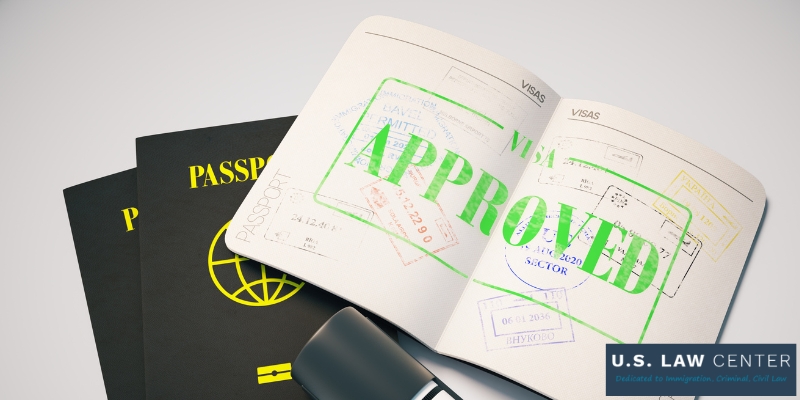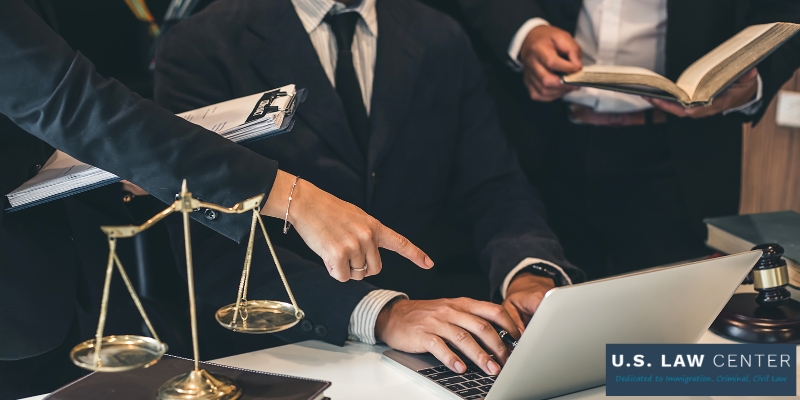Riverside Green Card and Visa Lawyer

Permanent legal residency (a green card) provides an immigrant with the freedom to live and work permanently in the United States. At U.S. Law Center, our Southern California immigration firm, our attorneys take great pleasure in helping clients achieve permanent immigrant status.
Understanding Green Card Eligibility
If you would like to speak with a member of our firm about a green card application or a long-term strategy designed to help you attain permanent resident status, please contact our Riverside County office to arrange a consultation. We can help you with a wide range of visas and green card issues, including those related to:
- Nonimmigrant work visas: An application for an H-1B visa or another employment-based (EB) visa may be filed with dual intent by an applicant who intends to later pursue permanent lawful residency.
- Family immigration visas: Our lawyers take great pleasure in assisting U.S. citizens and permanent legal residents as they sponsor the family-based immigration of spouses, fiancés/fiancées, children, parents and siblings.
- Asylum or refugee status: A person who has a well-founded fear of persecution can apply for asylum or refugee status and permanent residency (a green card). The feared persecution must be based on the applicant’s race, nationality, religion, membership in a particular social group, identification with a particular social group or political opinion. It is extremely important to apply for refugee status shortly after arriving in the United States.
- Immigrant investor EB-5 status: A foreign national who is prepared to invest a minimum of $1 million in a United States business or who is establishing a business that will benefit the U.S. economy may qualify for permanent residency status.
- Special immigrant EB-4 status: Religious workers, employees and former employees of the U.S. government and widows/widowers of U.S. citizens are among those who are eligible for green cards under special status.
- Returning residents (SB): Immigrants who previously had a green card can return to the United States after being abroad for more than one year.
- Employment green cards
- Student visas (F)
A green card does not offer the opportunity to fully participate in American society. If you have as your long-term goal achieving U.S. citizenship, talk to our attorneys about an appropriate strategy.
Get The Quality Counsel You Need For Your Immigration Concerns
If you would like to speak with one of our lawyers about obtaining a green card or have another question about our immigration law practice, please email or call our Riverside County office at 866-665-1696 to arrange a consultation.
Evening and weekend appointments are available. Our fees are competitive and we accept credit cards. Se habla español.
Green Card and Visa Law Resources
- Employment Green Cards
- Family Immigration Visas
- Fiancé And Spouse: K-1, K-3 Visas
- Nonimmigrant Work Visas
- Canada And Mexico: TN Visa
- Education And Culture: J Visa/Q Visa
- Extraordinary Ability: O Visa
- Intracompany Transfer: L Visa
- Professional Immigration: H-1, H-1B Visas
- Religious Worker: R Visas
- Students: F Visas
- Treaty Trader And Investor: E-1, E-2 Visas
Nonimmigrant Work Visas
A primary area of practice at U.S. Law Center, our Southern California immigration law firm, is employment-related visa services. Our attorneys travel nationwide to assist corporate clients with the recruitment and placement of foreign nationals in the U.S. work force. Our firm has ongoing relationships with several employment recruiters in the fields of technology, medicine and engineering.
We are equipped to handle a wide range of immigration concerns for your business and personal needs. Contact us today to arrange a consultation.

Ensuring That Your Business’s Immigration Needs Are Properly Handled
A U.S. company seeking to recruit or employ a talented foreign national has a significant investment to protect and cannot afford unnecessary delays in the processing of the work visa, denial of a visa application or sanction for failure to comply with employment verification requirements. Errors on the part of the employer or the employer’s general counsel during the application process may result in the prospective employee being barred from entering the United States temporarily or even permanently.
As members of a boutique practice with a focus on employment-based visa services, our attorneys provide thorough, timely and insightful representation designed to protect our clients from those risks and promote their business interests. We are prepared to handle applications for the following categories of nonimmigrant work visas:
- Treaty trader E-1 visa
- Investor E-2 visa
- Professional H-1B and H-1B1 visa
- Educational and cultural exchange programs J-1 visa/Q visa
- Intracompany transferee L visa
- Extraordinary ability O-1 visa
- Canada and Mexico TN visa
- Religious worker R-1 visa
- Agricultural worker H-2A visa
- Nonagricultural worker H-2B visa
- Artist and athlete P-1 visa
- Athlete and entertainer P-2, P-3 visa
- Trainee H-3 visa
- Entertainment support O-2 visa
If you are a prospective employee, you may have as a final goal employment-based residency (a green card) or U.S. citizenship. Our immigration lawyers will craft a multistage strategy toward that goal. We also help employees with family-based visa applications for their spouses and children.
If you would like to speak with one of our lawyers about our immigration law practice, please email or call our Riverside County office at to arrange a consultation. Evening and weekend appointments are available. Our fees are competitive and we accept credit cards.
Canada And Mexico: TN Visa
Citizens of Canada and Mexico may be eligible under the North American free trade agreement (formerly NAFTA) to enter the U.S. under TN status to work at certain specialized occupations. Petitioning for TN status (commonly referred to as a TN visa) is a relatively simple process; however, an error, omission or poorly worded statement on supporting documentation may result in denial of the application. Therefore, it is extremely important that a petition is meticulously prepared.
At U.S. Law Center, we focus extensively on nonimmigrant work visas. If you would like to discuss a TN visa application with one of our attorneys, please contact our office to arrange a complimentary consultation.
Entering The U.S. From Canada On A TN-1 Visa
Entry from Canada to work at a profession under the trade agreement is deceptively simple. The employee simply arrives at the border and presents documentation of an offer of employment from a U.S. employer, along with copies of college transcripts and other evidence that the employee is qualified for the position. The U.S. immigration officer at the border then grants or denies TN status. If a petition is denied, there is no appeal forum. A border official can revoke a TN visa at any time.
Entering The U.S. From Mexico On A TN-2 Visa
A Mexican citizen must obtain a U.S. TN visa at a U.S. consulate, generally in Mexico. Once the TN visa stamp is recorded in the Mexican citizen’s passport, the process for acquiring TN status is similar to that for a Canadian.
Unlike the H-1B visa, TN status does not provide for dual intent and a path to a green card. If permanent residency is your goal, our lawyers will work with you to craft an appropriate multistage strategy.
NAFTA Professions Qualifying For TN Status
A professional may qualify for a TN visa in a broad range of professions, including accounting, science, health care, education and computer science. It is important that an application and the letter of intent from the employer describe the position and qualifications in terms that meet U.S. Citizenship and Immigration Services (USCIS) standards.
Denial of TN status is more common for some professions, including management consultants and computer analysts, than others. An immigration officer might also deny an application for renewal of TN status if it appears that the applicant is using renewal in lieu of an H-1B visa.
TD-1 And TD-2 Status For Spouses And Children
Spouses and unmarried children (under the age of 21) of a TN visa holder are eligible to enter the U.S. under the derivative TD-1 and TD-2 visas. The spouse and children are not required to be Canadian or Mexican citizens and are eligible to remain in the U.S. for the duration of the TN visa holder’s stay.
If you would like to speak with one of our lawyers about the TN visa program for Canadian and Mexican nationals or have another question about our immigration law practice, please email or call our Riverside County office at to arrange a consultation. Evening and weekend appointments are available. Our fees are competitive and we accept credit cards.
If you are a prospective employee, you may have as a final goal employment-based residency (a green card) or U.S. citizenship. Our immigration lawyers will craft a multistage strategy toward that goal. We also help employees with family-based visa applications for their spouses and children.

Education And Culture: J Visa/Q Visa
Attorneys at U.S. Law Center assist sponsoring schools, research institutes and cultural organizations in J-1 visa and Q visa applications for the promotion of educational and cultural exchange programs. J and Q visas allow students, trainees involved in on-the-job training, teachers, researchers and consultants to travel in the United States and participate in the demonstration and sharing of specific knowledge. These are temporary work visas, and visa applicants are required to demonstrate binding ties to their home countries, that they have sufficient funds to cover expenses in the United States and that they intend to return home to use the skills and experience acquired in the U.S.
Representing Sponsoring Organizations
Our lawyers are prepared to represent approved sponsoring organizations, including organizations arranging for exchange programs for university students, research scholars, teachers, professors, au pairs, trainees and camp counselors. If our client is applying for temporary immigration under a J-1 visa, we will prepare form IAP-66 on behalf of the designated sponsoring organization and visa application form DS-156 on behalf of the applicant. When representing a participant in the Q exchange program, we prepare form I-129, petition for nonimmigrant worker, on behalf of the applicant and form I-797 on behalf of the sponsoring organization. Our office files all forms with U.S. Citizenship and Immigration Services (USCIS) and monitors the progress of the application.
Apply For Your Visa Well In Advance Of Your Trip
Current security measures involve extensive screening of exchange visitor visa applications under the cultural exchange Q visa or exchange visitors J visa programs. It is important to begin the application process as soon as possible to ensure timely approval.
Family Members Of The Exchange Visitor
The spouse and/or unmarried children under the age of 21 of a J visa holder may apply for entry under J-2 status. Our attorneys handle all related applications and filings as part of our services for the J visa applicant.
If you represent an educational or cultural organization and would like to speak with one of our lawyers about J visa or Q visa application services, please email or call our Riverside County office at to arrange a complimentary consultation. Evening and weekend appointments are available. Our fees are competitive and we accept credit cards.
Extraordinary Ability: O Visa
Those who have received international acclaim, demonstrating extraordinary ability in the arts, athletics, sciences, education, business or the motion picture or television industry are eligible for entry into the United States under the nonimmigrant O visa program. Others who have received O-1 or O-1A visas include chefs, carpenters and lecturers. The O visa allows an outstanding individual to perform work only in the area of his or her extraordinary ability.
At U.S. Law Center, our attorneys assist organizations and employers throughout the United States in petitions for O visas and other nonimmigrant work visas.
Qualifications For An O Visa For The Artist Or Athlete
A recipient of the Nobel Prize or another prestigious international award would be eligible for an O-1 visa. Extraordinary ability can also be demonstrated by documentation of three of the following qualifications:
- Receipt of nationally or internationally recognized prizes or awards for excellence
- Membership in associations that require outstanding achievement
- Publication of material in professional or major trade publications or major media about the applicant’s work
- Participation on a panel or individually, judging the work of others in the same or an allied field of specialization
- Original scientific, scholarly or business-related contributions of major significance
- Authorship of scholarly articles in professional journals or other major media
- Employment in a critical or essential capacity for an organization that has a distinguished reputation
- The ability to command a high salary
An employer must also provide a financial statement and a description of work the visa holder will perform while in the United States. Our immigration lawyers handle all phases of U.S. Citizenship and Immigration Services (USCIS) processing on the petitioner’s behalf, including preparation and filing of the required form I-129 and supporting documentation. A simple error or omission in the required material can result in a significant and costly delay. Our firm is a small, tightly focused employment immigration practice, and our attorneys have extensive and successful experience in this area. If you would like to discuss our services, please contact our Southern California office to arrange a consultation. We urge you to begin the petition process as soon as possible.
O-2 Visas For Support Personnel Of O-1 Visa Holders
Support personnel of O-1 visa holders in the fields of athletics, movie and television production and other entertainment areas are eligible for entry to the United States under O-2 status. (This status is not available to those in the sciences, business or education.)
O-3 Dependent Visa For The Spouse And Children
The O-1 visa holder’s spouse and unmarried children under the age of 21 are eligible for O-3 visas. O-3 status allows an individual to attend school, but not to work.
If you would like to speak with one of our lawyers about the O visa program or have another question about our immigration law practice, please email or call our Riverside County office at to arrange a consultation. Evening and weekend appointments are available. Our fees are competitive and we accept credit cards.
Intracompany Transfer: L Visa
The intracompany transfer L visa provides essential flexibility to multinational corporations with operations in the United States. Through the L-1A temporary work visa, a company can transfer executives and managers and, under the L-1B visa, employees with specialized knowledge to a U.S. office, subsidiary or affiliated company. At U.S. Law Center in Southern California, we assist corporate clients worldwide with the smooth and efficient processing of L visa applications.
Protecting Your Business Operation
An error or omission on an L visa application may result in a serious and expensive delay or denial. Qualification is based on strict requirements regarding the relationship between employer and employees, length of time employees have worked for the company, the qualifications of employees, the financial standing of the company and, if the U.S. operation is a new venture, its feasibility. As members of a boutique firm focused on employment immigration, our attorneys have extensive experience processing intracompany transferee visas on behalf of corporate officers and general counsel.
Blanket Intracompany Transferee Petition
If your company anticipates the need for future or multiple L-1 transferee visas, our attorneys may recommend the company apply for blanket petition entity status with U.S. Citizenship and Immigration Services (USCIS), a route to routine L-1 visa approval for eligible employees.
L-2 Visas For Spouses And Children Of Transferees
Under L-2 status, a spouse and unmarried children under the age of 21 are allowed to join an intracompany transferee in the United States. A spouse and children can attend school or college and, with appropriate employment authorization from USCIS, are allowed to work. Servants paid by a source outside the U.S. may be eligible for a B-1 visa with work authorization.
USCIS Processing In As Little As 15 Days
Our firm prepares form I-797 on behalf of the employer, form DS-156 on behalf of the employee and all supporting documentation and handles all filings and responses. Under premium processing, the USCIS may rule on a petition within 15 days of filing. An approved L-1 visa is valid for three years.
If you represent a foreign employer seeking to transfer management and professional staff into the United States and would like to speak with one of our lawyers about our immigration services, please email or call our Riverside County office at to arrange a complimentary consultation. Evening and weekend appointments are available. Our fees are competitive and we accept credit cards.
If you are a prospective employee and have as a final goal employment-based residency (a green card) or U.S. citizenship, our immigration lawyers will craft a multistage strategy toward that goal. We also help employees with family-based visa applications for their spouses and children.
Professional Immigration: H-1, H-1B Visas
At U.S. Law Center, our Southern California immigration law firm, we assist employers in recruiting skilled and highly educated foreign national workers. Our attorneys often make use of H-1B and H-1B1 temporary work visas as part of a comprehensive process leading to permanent legal residency (a green card) for foreign nationals. Our clients include companies involved in technology, marketing, finance, architecture, engineering, medicine and other areas. Our small, tightly focused practice allows our lawyers to remain abreast of U.S. Citizenship and Immigration Services (USCIS) requirements and international employment markets, providing our clients with effective representation in this particularly dynamic and challenging area of immigration law. Our attorneys, based at our Southern California offices in Riverside County, travel throughout the United States.
H-1B Classification
The H-1B visa, a nonimmigrant work visa, allows foreign nationals to enter the U.S. to work in positions that require a U.S. bachelor’s degree or its equivalent. The applicant must have those qualifications and be sponsored by a U.S. employer that is willing to pay the prevailing wage for the work. Our attorneys represent employers in H-1B visa petitions, filing the required labor condition application (LCA) with the Department of Labor and form I-129W and all supporting documentation with USCIS.
H-1B1 Classification
The H-1B1 visa is similar to the H-1B. It allows people in “specialty occupations” to work in the U.S. temporarily. To qualify for H-1B1 classification, the professional applicant must be able to document theoretical and practical application of specialized knowledge and must have at least a U.S. bachelor’s degree or its equivalent, and the job must require at least a bachelor’s degree or its equivalent. The H-1B1 visa applicant must have a sponsoring employer in the U.S. Our attorneys assist employers in filing the visa application, supporting documentation and LCA.

A Simple Error Can Cause A Significant Delay
When an employer has reached an agreement with a professional regarding employment, the company already has a significant investment to protect. By selecting a law firm with extensive experience in H-1B and H-1B1 visas, the company reduces the risk of an error or omission in the application and avoids resulting delay or denial. Attorneys at U.S. Law Center have a high rate of success in professional immigration visa applications.
Dependents Of H-1B Visa Holders
Our attorneys will handle applications for H-4 dependent visas for the spouse and unmarried children of an H-1B or H-1B1 worker. Dependents can enroll in schools in the U.S. without obtaining a student visa, but cannot work unless they qualify for a work visa.
If you would like to discuss a petition for a professional visa under the H-1B program with one of our lawyers or have another question about our immigration law practice, please email or call our Riverside County office at to arrange a consultation. Evening and weekend appointments are available. Our fees are competitive and we accept credit cards.
If you are a prospective employee, you may have as a final goal employment-based residency (a green card) or U.S. citizenship. Our immigration lawyers will craft a multistage strategy toward that goal. We also help employees with family-based visa applications for their spouses and children.
Religious Worker: R Visas
At U.S. Law Center in Southern California, our attorneys assist religious workers and organizations with R-1 visa applications. The religious worker visa enables a person engaged in a religious occupation to enter the United States to follow that calling.
Who Is A Religious Worker?
When preparing an application for an R-1 visa, our lawyers support our client’s request with proper documentation in accordance with U.S. Citizenship and Immigration Services (USCIS) guidelines. A nun, monk or religious brother or sister who has taken vows is typically accepted as having demonstrated the required lifelong commitment to a religious vocation. Other examples of religious workers as defined by immigration services are liturgical workers, religious instructors, cantors, catechists, workers in religious hospitals, missionaries, religious translators and religious broadcasters. A janitor, secretary or fundraiser is not considered a religious worker and is not eligible for an R-1 visa. The religious worker visa is a nonimmigrant work visa. The worker does not have to maintain a residence abroad, but must intend to leave the U.S. at the end of R-1 status.
Families Of Religious Workers
Our attorneys also handle applications for religious workers’ spouses and minor children (under 21) to enter the U.S. under derivative status. A child or spouse cannot work while in the U.S., but may attend school.
The Visa Application Process
We will handle your application for an R-1 visa at the U.S. embassy or consulate with jurisdiction over your place of permanent residence or at another U.S. consular office abroad. Our attorneys will prepare visa application form DS-156, proof of tax-exempt status or eligibility for tax-exempt status for your employing organization, and a letter from your employer certifying your position in your organization.
If you would like to speak with one of our lawyers about an R-1 visa sponsorship petition or have another question about our immigration law practice, please email or call our Riverside County office at to arrange a consultation. Evening and weekend appointments are available. Our fees are competitive and we accept credit cards.
If you are a prospective employee, you may have as a final goal employment-based residency (a green card) or U.S. citizenship. Our immigration lawyers will craft a multistage strategy toward that goal. We also help employees with family-based visa applications for their spouses and children.
Family Immigration Visas
At U.S. Law Center, our attorneys practice exclusively in the area of immigration law, providing families and individuals throughout Southern California with legal services marked by commitment and experience.
When assisting clients with family immigration, our lawyers play an active part in the reunification of husband and wife, fiancé and fiancée, parent and child, brother and sister — relatives dispersed across the globe by economic and political circumstances. If you are a lawful permanent resident or a U.S. citizen and would like to sponsor a relative for family-based immigration, please contact our Riverside County office to arrange a consultation.
K Visas, Immediate Relative (IR) Visas
The most common category of family immigration is the fiancé or marriage K visa. A K-1 visa provides for permanent immigration of the spouse of a U.S. citizen or legal permanent resident. A K-3 visa allows a person engaged to a U.S. citizen or legal resident to enter the United States in the months before marriage. An immediate relative (IR) visa allows the child of a U.S. citizen or permanent resident to enter the United States.
Limited Family-Based Immigration Preferences
- First preference: Unmarried children (under 21) of U.S. citizens
- Second preference: Spouses of lawful permanent residents, the spouses’ children and unmarried children of legal permanent residents
- Third preference: Married children of U.S. citizens
- Fourth preference: Siblings of adult U.S. citizens
Our attorneys will handle all phases of processing for a K visa or preference-based visa. If you have as your long-term goal achieving U.S. citizenship, talk to our attorneys about an appropriate strategy.
Nonimmigrant work visas, student visas and other special status categories allow the spouse and children of a visa holder to enter the United States under dependent status.
If you would like to speak with one of our lawyers about family immigration or have another question about our immigration law practice, please email or call our Riverside County office at to arrange a consultation. Evening and weekend appointments are available. Our fees are competitive and we accept credit cards.

Fiancé And Spouse: K-1, K-3 Visas
At U.S. Law Center in Riverside County, our attorneys assist U.S. citizens in immigration processing necessary to bring foreign national husbands, wives, fiancés and fiancées into the United States, handling all phases of K-3 and K-1 visa processing and applications for permanent resident status.
In addition to the K visa, our lawyers handle all other types of family immigration. If you would like to speak with a member of our firm about your situation, please contact us to arrange a consultation.
The K-3 Spouse Visa
The K-3 visa allows the alien spouse of a U.S. citizen to enter the United States. An immigrant petition (form I-130) must be filed when the I-129F (K-3 visa petition) is filed. The K-3 visa is intended to shorten the waiting period for a spouse to enter the U.S. Once the spouse has entered the U.S., he or she will be eligible to adjust his or her status to permanent residency, a much easier process than applying for immigrant status abroad.
The K-1 Fiancé/Fiancée Visa
A K-1 visa is a nonimmigrant visa intended to allow the fiancé or fiancée of a U.S. citizen to enter the United States to get married. The U.S. citizen and alien fiancé(e) must have met personally in the two years before filing the necessary I-129F petition with U.S. Citizenship and Immigration Services (USCIS). Upon approval of the petition, the fiancé(e) can enter the United States. The marriage must take place within 90 days or the fiancé(e) risks removal.
If you have as your long-term goal achieving U.S. citizenship, talk to our attorneys about an appropriate strategy. The spouse and children of a nonimmigrant work visa holder or of a person entering the U.S. on a student F visa are entitled to enter the U.S. under dependent status.
If you would like to speak with one of our lawyers about a K-3 spouse visa or a K-1 fiancé(e) visa or have another question about our immigration law practice, please email or call our Riverside County office at to arrange a consultation. Evening and weekend appointments are available. Our fees are competitive and we accept credit cards.
Students: F Visas
If you plan on attending a U.S. school, college or university as a foreign student, it is important that you begin the process of U.S. Citizenship and Immigration Services (USCIS) approval of your F-1, J-1 or M-1 student visa at the first opportunity. A student visa application must be submitted to the U.S. consulate, consular office or U.S. embassy with jurisdiction over your permanent residence, along with USCIS form I-20A-B/ID (certificate of eligibility) from the institution to which you have been admitted, along with a letter of admission, proof that you have funds to support yourself while in the United States, evidence you intend to return home and other documentation.
It is extremely important that your petition and supporting documentation be meticulously prepared. Any error, omission or poorly worded answer may result in a processing delay or denial of your J, M or F visa petition. At U.S. Law Center, our attorneys devote their practice exclusively to immigration law and have extensive, successful experience in student visa processing. If you would like to discuss your situation with a member of our firm, please contact our office to arrange a consultation.
Spouse And Children Of The Student Visa Holder: F-2 Status
A student visa holder’s spouse and unmarried children under the age of 21 are allowed to join the student in the U.S. under F-2 status. The prospective student’s form I-20A-B may be used to request an F-2 visa for dependents. If the spouse and dependent children are entering the United States at a later date, they will need to submit form I-20A-B from the school the student visa holder is attending. F-2 visa holders cannot work while in the U.S. If dependents want to attend a post-secondary institution in the U.S., they must change their status to F-1. An F-2 child may attend school through the 12th grade.
A student visa is a nonimmigrant visa, and the student is expected to return home at the end of the educational experience. If you have as your long-term goal achieving permanent residency, talk to our attorneys about an appropriate strategy.
If you would like to speak with one of our lawyers about a student visa or have another question about our immigration law practice, please email or call our Riverside County office at to arrange a consultation. Evening and weekend appointments are available. Our fees are competitive and we accept credit cards.
Treaty Trader And Investor: E-1, E-2 Visas
At U.S. Law Center, our immigration attorneys assist businesses and foreign nationals with applications for treaty trader E-1 visas and treaty investor E-2 visas. These nonimmigrant work visas are designed to support trade and investment between the United States and nations that have treaties of commerce with the U.S.
E-1 And E-2 Visas As Part Of A Comprehensive Strategy
E visas are among a variety of options our lawyers may consider when developing strategies to help clients accomplish immediate and long-term business and personal goals. If you are a national of a treaty country and are coming to the U.S. to carry on substantial trade to develop and direct the operations of a business in which you have invested or to invest a substantial amount of capital, you may be eligible for treaty trader or treaty investor status. Your children, spouse and employees will then also be eligible for E-1 or E-2 status.
It is critical to support an E visa application with appropriate documentation. If you would like to discuss your situation with one of our immigration attorneys, please contact our Corona, California, office to arrange a complimentary consultation. Our attorneys travel throughout the nation on behalf of corporate clients.

Applying For A Treaty Investor Or Treaty Trader Visa
Our attorneys will prepare application form DS-156 and file your application for a treaty investor or treaty trader visa at the U.S. consulate in your home country. They will include documentation of the ownership of your company, a letter from your employer describing your position with the firm and documentation that the trading or investment activity meets U.S. Citizenship and Immigration Services (USCIS) requirements for E-1 or E-2 status.
EB-5 Investment Visa And Permanent Resident Status
If your investment is at least $500,000 or grows to that amount, you may be eligible for an EB-5 visa and can petition for permanent immigration status (a green card).
If you would like to speak with one of our lawyers about a treaty trader or treaty investor visa petition or have another question about our immigration law practice, please email or call our Riverside County office at to arrange a consultation. Evening and weekend appointments are available. Our fees are competitive and we accept credit cards.
If you are a prospective employee, you may have as a final goal employment-based residency (a green card) or U.S. citizenship. Our immigration lawyers will craft a multistage strategy toward that goal. We also help employees with family-based visa applications for their spouses and children.
Employment Green Cards
At U.S. Law Center, our employment immigration attorneys are focused on meeting every client’s goals in the most efficient and cost-effective manner. That often means assisting an employee in pursuit of a lawful permanent residency visa (green card) based on the terms of employment.
EB-1 high-priority status: Foreign nationals who possess extraordinary ability in the sciences, arts, education, business or athletics; are outstanding professors or researchers; or are managers or executives on international transfer to the U.S. on behalf of multinational business entities are eligible under the EB-1 program to file for permanent residency (green cards) and do not need to file labor certification applications.
EB-2 professional status: Foreign nationals who have exceptional ability in the sciences, arts or business; are advanced degree professionals; or are qualified alien physicians who will practice medicine in an underserved area of the U.S. are eligible for employment green cards under EB-2 status.
EB-3 skilled or professional status: Foreign nationals with at least two years’ experience as skilled workers, professionals with bachelor’s degrees who do not qualify for either categories EB-1 or EB-2, aliens with at least two years of experience as skilled workers, professionals with baccalaureate degrees and unskilled workers who can contribute abilities unavailable in the U.S. are eligible for employment green cards under EB-3 status.
EB-4 special immigrants: Religious workers, aliens who have worked for the U.S. government overseas and widows/widowers of U.S. citizens are among those who qualify for work-related green cards as special immigrants.
EB-5 immigrant investors visa: An investor who meets certain qualifications may be eligible for lawful permanent resident status.
An employment green card does not provide the holder with all of the rights of U.S. citizens. If you have as your long-term goal achieving U.S. citizenship, talk to our attorneys about the naturalization process.
If you would like to discuss visas and green cards for your business or personal immigration needs with one of our lawyers, please email or call our Riverside County office in Corona at to arrange a consultation. Evening and weekend appointments are available. Our fees are competitive and we accept credit cards. Se habla español.
Making Immigration Law Work For You
The U.S. Law Center is a nationwide, full-service immigration law firm providing large corporations, small businesses and individuals with a full range of immigration processing and placement services.
866-665-1696